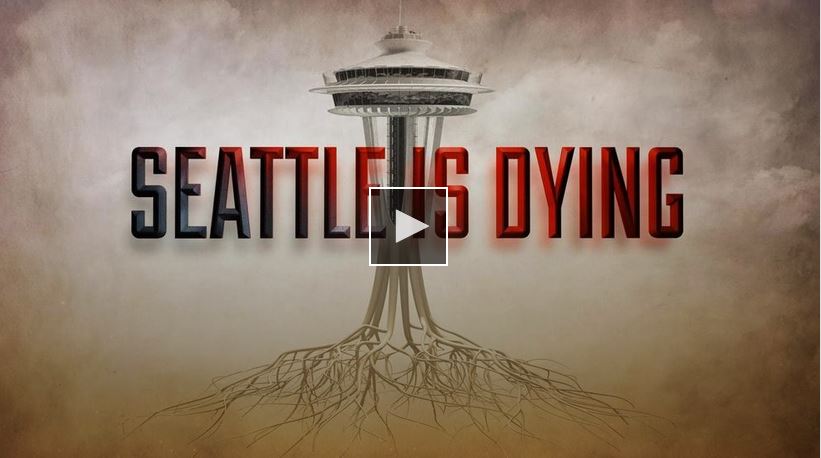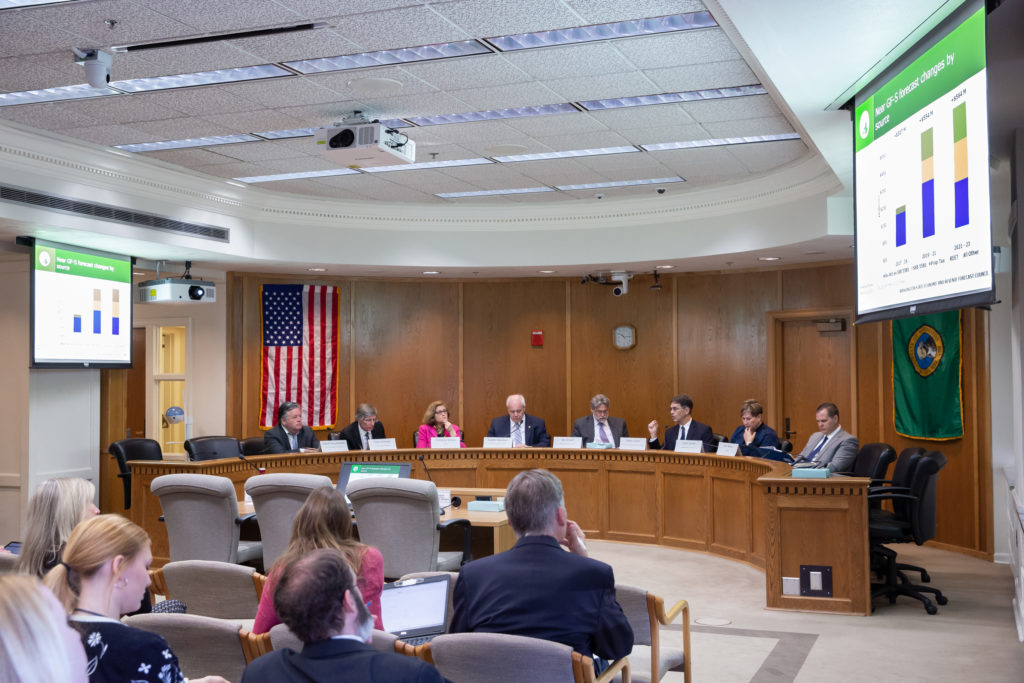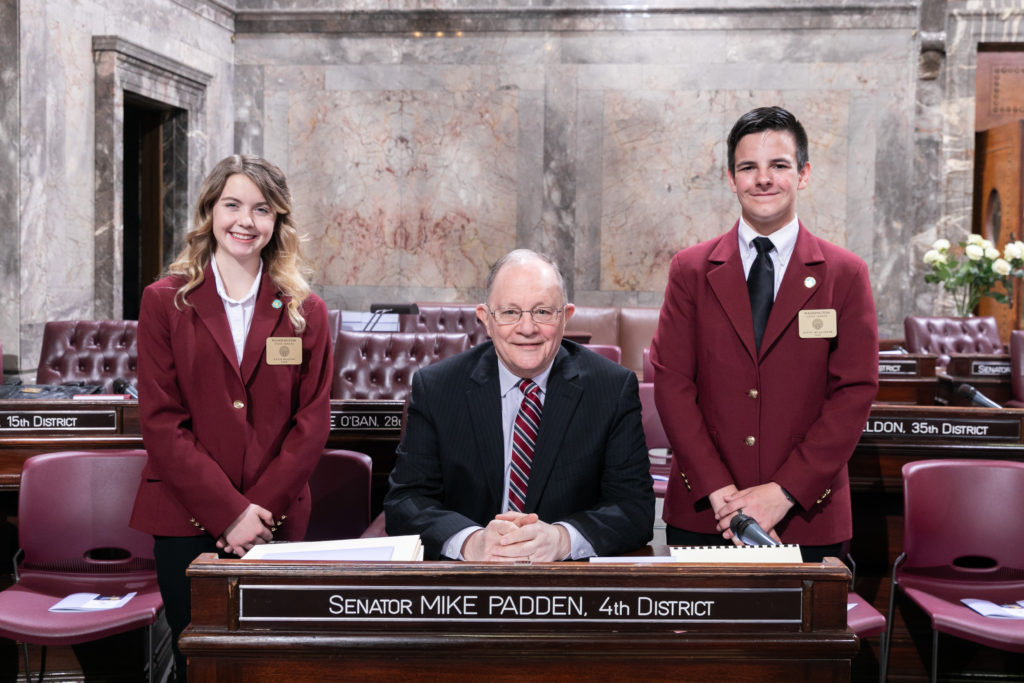The following newsletter was sent to Sen. Padden’s subscribers March 21, 2019. To subscribe to Sen. Padden’s newsletters, click here.
Back from the dead in Olympia
DUI bill poised for resuscitation after deadline ‘kills’ measure
Dear Friends and Neighbors,
Olympia is a town where the dead come back to life on a regular basis. Just when you think a bill has been killed, it can come roaring back from the grave. In the Legislature, nothing ever is really dead until people decide it is.
That’s the situation we’re in right now with the session’s major DUI bill, a measure I have sponsored that would send more repeat offenders to prison. This bill was looking mighty lifeless last week, when it failed to get a vote in the Senate before our March 13 mid-session deadline. Now our colleagues in the majority party are talking about bringing it back to life, by amending it to another bill. This is an indication of the strong support this measure has on both sides of the aisle, not to mention the importance of the bill itself.
Yet if this resuscitation is successful, it still won’t be easy getting the bill to the governor’s desk. I’ll tell you more about the argument in this week’s newsletter, as well as other legislation impacted by the mid-session deadline. Key thing to remember – the Legislature imposes these deadlines on itself, to speed the legislative process and discard proposals that have no chance of passage. But it’s a mistake ever to assume a bill is dead. In Olympia, where there is a will, there always is a way.
Sincerely,
Senator Mike Padden
A legislative farewell

Sen. Padden offers respects to the late Rep. Lynn Schindler Wednesday at a memorial service during a joint session of the House and Senate. Schindler, who died in December, represented the 4th Legislative District in the state House for 10 years starting in 1998.
DUI measure exposes a central criminal justice debate
More prison terms for repeat offenders butts up against effort to get soft on crime
You might wonder – why would anyone oppose a bill that would get impaired drivers off the road? Most of us would consider it a victory if we sent more of them to prison. That’s what Senate Bill 5299 does, by extending the “look-back” when courts impose sentence. In Washington, the fourth conviction is a felony, requiring prison time, but courts can consider only convictions within the last 10 years. This is why we see so many embarrassing headlines about drunk drivers convicted a half-dozen times or more who have never set foot in a state correctional institution.
The latest version of the bill extends the look-back to 15 years. We don’t have an estimate yet of the number of repeat offenders this would send to prison, but we do know it’s more than are going there today. That’s the whole idea.
Unfortunately, some of our more liberal Western Washington colleagues look askance at the idea of sending more people to prison. This year, under the leadership of the Legislature’s Seattle-dominated majority, we are seeing multiple proposals to shorten sentences, let prisoners out early, and gut some of the tough anti-crime legislation of the 1990s that has helped reduce crime rates in this state, like “Three Strikes You’re Out.”
Many who seek a softer approach to crime express concern for convicts – which of course diminishes the concerns of their innocent victims and surviving family members. The argument is always about cost and prison crowding. Cost, of course, is hardly an issue in a year when the state will collect more than $50 billion in taxes. Prison crowding is really the Legislature’s fault. When our colleagues last controlled the statehouse, during the last recession, they closed numerous prison facilities — essentially forcing the showdown we see this year.
So we are seeing an interesting rift in the making in the majority party. Some members were as dismayed as we were that the DUI bill stalled. They quickly found a way to revive the bill – the plan is to amend a House DUI bill in the Senate to include the longer look-back. Yet other members of the majority party say a tougher approach to DUI is something we just can’t afford – as you can see in an episode of TVW’s Inside Olympia, which airs tonight. The debate of the next few weeks is going to be very interesting.
New revenue forecast boosts tax collections $850 million
Makes tax increases even harder to justify
More good news from the state Economic and Revenue Forecast Council: The red-hot Washington economy is expected to pour another $850 million into state coffers through June 30, 2021. That means tax collections for the next budget period will have increased more than $5 billion since the last one. This was almost entirely due to growth in the state economy, not a tax increase
Over the last six years, state tax collections have risen a whopping 45 percent. That’s twice the rate of growth in personal income. Our team’s budget chief, Sen. John Braun, R-Centralia, observes that we could write a budget that pays for everything the state is currently doing, and still have $2.5 to $3 billion left over.
We’ll just have to see how this affects the plans of our urban Western Washington colleagues. They began the session with a plan to raise taxes $5 billion, on top of everything else, to fuel even greater spending. This includes a devastating increase in business taxes and an income tax on capital gains that almost certainly would be expanded to a general income tax once courts give the thumbs-up. But the gusher of money just keeps coming. An enormous tax increase in the midst of record-breaking revenues might be hard to explain even in Seattle. Especially when it threatens to kill our golden goose, an economy that functions best when government interferes the least.
KOMO report exposes roots of Seattle’s homelessness crisis

You can see this KOMO-TV special report by clicking here.
A KOMO-TV special report over the weekend is the talk of Western Washington, and it has plenty of relevance on our side of the mountains as well. Seattle right now is inundated by the homeless, with tent camps seemingly under every bridge, derelicts in the streets and a fast-rising crime rate. The city’s political leaders are reacting like deer in the headlights. The KOMO-TV special exposes the real reasons for this crisis – a narcotics epidemic, generous public benefits and the reluctance of Seattle’s political leaders to enforce laws against vagrancy. It is an object lesson in the unintended consequences of liberal policies. Lest you think this is a problem limited to the Emerald City, our Seattle-dominated Legislature is considering a bill that would require every community of the state to adopt the same failed hands-off policies toward the homeless. Though the bill did not advance before the deadline, the measure has a fiscal impact and could easily be revived in the budget.
Gun bills, alive and dead
Keeping in mind that nothing is ever really dead, we can say nevertheless that the prospects for gun-control legislation were diminished when last week’s deadline passed. Three of the four top-priority bills for the Alliance for Gun Responsibility failed to garner enough support to advance in the House or Senate. All had one thing in common: They failed to address the root cause of violence, the mental state of the person behind the trigger, and heaped more restrictions and red tape on those who are inclined to obey the law.
These failed proposals would have banned magazines of 10 rounds or more (HB 1068/SB 5062), banned guns that cannot be detected by a metal detector (HB 1073/SB 5061), and required concealed pistol license holders to attend firearm safety courses every five years (SB 5174).
Barring efforts to revive these bills, the biggest debates we are likely to see in coming weeks include another top-priority proposal for gun-control advocates, HB 1225. This bill would impound weapons and suspend due process rights for gun owners when police respond to domestic violence calls. Also advancing is SB 5434, which would declare childcare facilities to be “gun-free zones.” This bill won’t deter a shooter, but certainly will create a headache for those who abide by the law.
Another gun measure, funding a bump-stock buyback program (SB 5954) cleared the House and Senate and was signed into law last week.
Thanks to Kylie Heaton and Gavin McAllister for serving as Senate pages!
This week it is my honor to host two Senate pages:
Kylie Heaton, 15, is a 9th grader at University High School. She is the daughter of Russ and Kristi Heaton of Spokane Valley.
Gavin McAllister, 14, is a 9th grader at the STEM academy at Spokane Valley Tech – and an Eagle Scout. He is the son of Brent and Dorianne McAllister of Spokane Valley.
Congratulations to these two youths on a terrific week at the Capitol. The Senate page program gives youths age 14 through 16 a chance to see the Legislature in action. If you know of a teen-ager who might be interested in joining us in Olympia this year, more information is available here.
Contact us!
We’re in Olympia for the duration. If you have a question or concern about state government, please do not hesitate to contact our office. We are here to serve you!
Phone: (360) 786-7606
Street address: 106 Irv Newhouse Building, Capitol Campus, Olympia, WA 98504
Postal address: PO Box 40404, Olympia, WA 98504
Email address: Mike.Padden@leg.wa.gov














